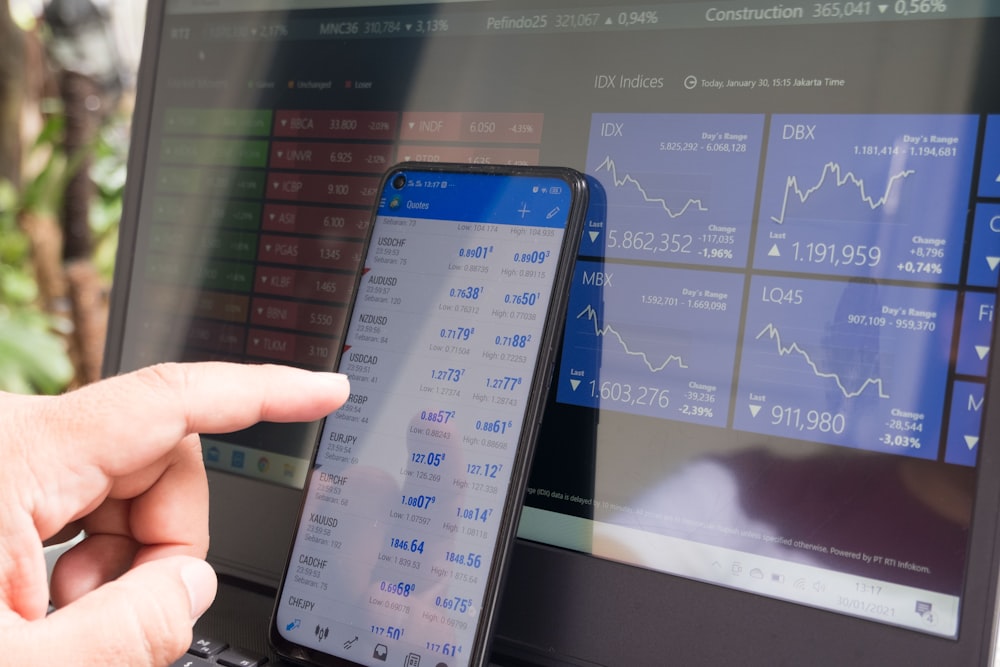Major US Stock Indices Continue To Decline Amid Negative Investor Sentiment
Image Source: Unsplash
Last week, the Nasdaq (US100) and S&P 500 (US500) indices fell for the fifth week in a row and the Dow Jones Industrial Average (US30) for the sixth. This is the longest losing streak for the S&P 500 since mid-2011 and the Nasdaq since late 2012. Investors are concerned that aggressive tightening by the Fed could lead the economy to recession. As the stock market closed on Friday, the Dow Jones index (US30) decreased by 0.30% (-0.24% for the week), the S&P 500 (US500) lost 0.57% (-0.18% for the week), and the Nasdaq Technology Index (US100) fell by 1.40% on Friday and became the fallen leader (-1.52%) for the week.
Markets estimate a 75% chance of a 75 basis point rate hike at the Fed's June meeting, although Fed Chairman Jerome Powell indicated last week that the Committee was not considering a 75% rate hike. Market volatility is likely to continue as a more hawkish Fed stance, a sharp rise in bond yields, and geopolitical risks such as the war in Ukraine affect investor sentiment. Rumors that Russian President Vladimir Putin may declare war on Ukraine to call up reserves during his Victory Day speech have undermined market sentiment. So far, Putin has characterized Russia's actions in Ukraine as a "special military operation" rather than war or invasion.
In April, the US economy added 428,000 jobs, slightly slower than in recent months. The unemployment rate remained at 3.6%. The main news in the Labor Department's jobs report was that average hourly earnings increased by only 0.3%, bringing the annual growth rate for the last three months to 3.8%. This is much slower than the growth rate in nominal wages in 2021. If this trend continues, the country will soon face a slowdown in job creation.
Major European indices traded lower on Friday. German DAX (DE30) fell by 1.64% (-2.30% for the week), French CAC 40 (FR40) decreased by 1.73% (-3.26% for the week), Spanish IBEX 35 (ES35) lost 1.34% (-2.32% for the week), British FTSE 100 (UK100) was down by 1.54% (-1.61% for the week). According to European Central Bank President Christine Lagarde, stagflation is not the most likely economic outcome for the Eurozone, although the war in Ukraine is slowing growth and accelerating inflation. ECB officials are still determined to continue normalizing monetary policy, and many remain open to the possibility of a first interest rate hike in July. Lagarde also added that net asset purchases should end early in the third quarter based on available data.
Germany will show solidarity with European Union countries looking for alternatives to Russian gas and oil. It will help other countries without ports in the North Sea or the Baltic Sea gain access to liquefied natural gas (LNG). Last week on Thursday, Germany took steps to boost its LNG imports by leasing four floating storage and regasification units and choosing the port of Wilhelmshaven on the North Sea as its first transshipment point. Oil prices are trading around $109-110 for WTI crude. The main focus is now on the negotiations in the European Union over the Russian oil embargo, which is likely to reduce global supplies further. European Union governments are set to meet this week to decide how to secure countries most dependent on Russian energy, such as Hungary, Slovakia, and the Czech Republic. The proposal requires a unanimous vote of EU members.
According to the hedge fund Crescat Capital LLC, silver remains one of the most undervalued opportunities in financial markets (for the next 1-2 years). Also, according to the fund's analysts, precious metals companies have been performing incredibly well lately, which will undoubtedly affect their value growth.
Asian markets traded without a single trend last week. Japan's Nikkei 225 (JP225) gained 0.97% over the week, Hong Kong's Hang Seng (HK50) fell by 1.33% last week, and Australia's S&P/ASX 200 (AU200) decreased by 3.09% over the week. China's export growth slowed in April to its lowest level since June 2020. Last month, exports rose 3.9% year on year to $273.62 billion, up from a 14.7% increase in March. However, the export figure was above the average result of the analysts' survey. Imports changed little in April as tighter and expanded COVID-19 restrictions halted factory production and reduced domestic demand, exacerbating the overall economic problems.
In the commodities market, futures on gasoline (+10.82%), natural gas (+10.17%), Brent oil (+5.67%), WTI oil (+5.65%), and wheat (+5.09%) showed the biggest gains at the end of the week. Futures on palladium (-11.92%), lumber (-8.96%), coffee (-5.4%), cocoa (-3.7%), copper (-3.63%), soybeans (-3.56%), corn (-3.32%) and silver (-3.1%) showed the biggest drop.
Main market quotes:
- S&P 500 (F) (US500) 4,123.34 -23.53 (-0.57%)
- Dow Jones (US30) 32,899.37 -98.60 (-0.30%)
- DAX (DE40) 13,674.29 -228.23 (-1.64%)
- FTSE 100 (UK100) 7,387.94 -115.33 (-1.54%)
- USD Index 103.66 -0.09 (-0.09%)
Important events for today:
- Japan Monetary Policy Meeting Minutes at 02:50 (GMT+3);
- Japan Services PMI (m/m) at 03:30 (GMT+3);
- US FOMC Member Bostic Speaks at 15:45 (GMT+3).
Disclosure: This article reflects a personal opinion and should not be interpreted as an investment advice, and/or offer, and/or a persistent request for carrying out financial transactions, ...
more



